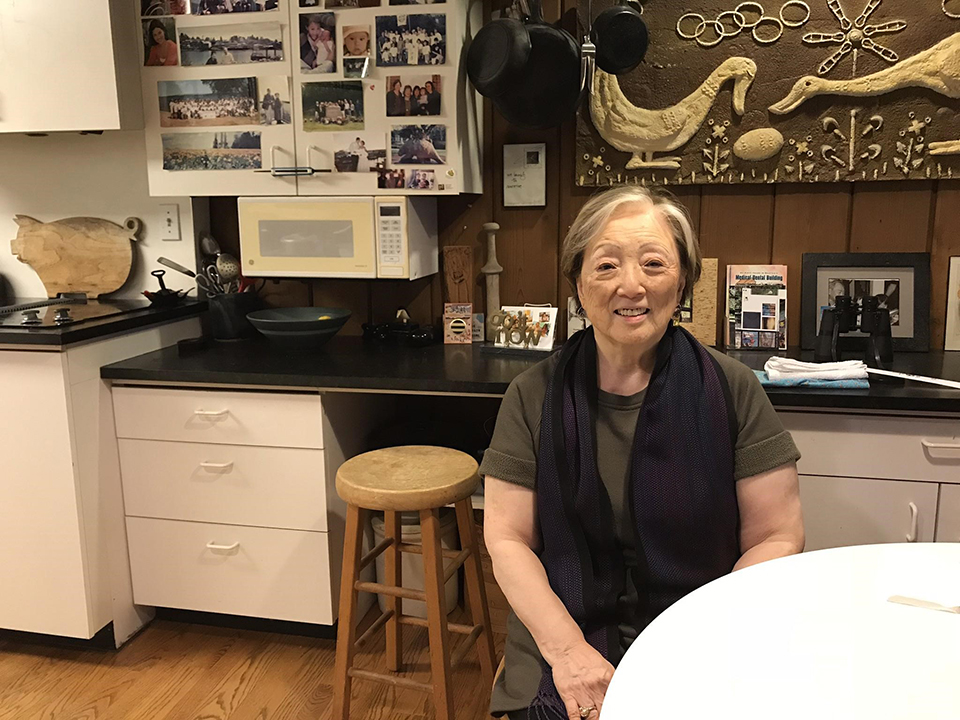By Chi-Wei Chia
Northwest Asian Weekly

Dee Goto, one of the board members of the Japanese Cultural and Community Center of Washington, cares deeply about passing on Japanese ancestors’ stories and wisdom to younger generations and has been dedicated to promoting Japanese culture with the JCCCW over the years. (Photo by Chi-Wei Chia)
As time passes, the descendents of Japanese immigrants in the Northwest can lose their connections to Japanese culture. People who are not Japanese sometimes want to learn more about the culture. The Japanese Cultural and Community Center of Washington (JCCCW) is there for both of them.
“Many people my age who have Japanese ancestry and heritage don’t know how to speak or read Japanese,” said Stephanie Ikeda, the Museum Coordinator and Collections Manager of the JCCCW.
The JCCCW was formed in 2003 with the mission to preserve Japanese culture, history, and heritage.
The Seattle Japanese Language School was founded in 1902 and merged with the JCCCW in 2009.
“The Seattle Japanese Language School is the oldest Japanese language school in the United States,” said Dee Goto, a JCCCW board member.
The language school is for everyone — Japanese and non-Japanese, said Ikeda.
“I really enjoy working here and introducing Japanese culture and language,” said Atsuko Savorgino, the administrative assistant of the JCCCW and one of the teachers in the language school.
It’s important for not only Japanese Americans but also everyone who wants to learn about Japanese culture to know and understand the language, as it contains traditional Japanese values and lessons, said Goto.
“We teach students something like Nanakorobi Yaoki, which means if you fall down seven times, you need to get up eight times,” said Goto. “Despite all the discrimination and issues the Japanese faced, those values made us stronger, and we want to preserve that.”
Although many Japanese Americans can’t speak or read Japanese, Ikeda has noticed that more and more people, including non-Japanese, are getting interested in the culture and history, thanks to the rise of Japanese pop culture.
“Now is the time where more people are reclaiming their culture and heritage,” said Ikeda.
The JCCCW’s original goal was Japanese culture for Japanese and Japanese Americans, said Ikeda.
“Now, our goal is Japanese culture for everyone,” Ikeda said.
“I’ve seen some events that have more than half of the participants being non-Japanese, and they are just as passionate about Japanese culture as we are,” said Goto.
Besides the language school, JCCCW also holds events where people have the opportunity to learn about the culture through experiencing how holidays are celebrated in Japan, said Ikeda.
The Kodomo no Hi (Children’s Day Festival) is JCCCW’s spring event held in May, and it’s an event for small kids.
“The Kodomo no Hi is about having fun, playing games, but also in a very educational way,” said Ikeda. “We specifically pick activities that teach something about Japanese culture.”
The Bunka no Hi (Japanese Culture Day) is the fall event for older teenagers and adults that features historical artifacts exhibits, judo, karate, and various performances.
Both Kodomo no Hi and Bunka no Hi are free for everyone to attend.
Goto, who is in charge of the Omoide Project — a project to collect the stories of Japanese Americans relocated into internment camps during World War II — values the importance of getting to know Japanese elders and passing on their stories and values.
Goto believes that by doing so, people, especially Japanese children, can have more knowledge of what happened to the Japanese population during World War II, and gain a deeper understanding of traditional Japanese culture and value.
The Cultural Center also has Nikkei Bunko, the Japanese Language Library. The membership is affordable for most people, and it’s a low-cost way to read Japanese books without having to buy them, said Ikeda.
She hopes the many offerings of the cultural center will help Japanese Americans have a sense of belonging in the city and region.
“We want everyone to have a place here,” said Ikeda, “including Japanese whose family has been here for a long time and those who just arrived.”
Chi-Wei Chia can be reached at info@nwasianweekly.com.



